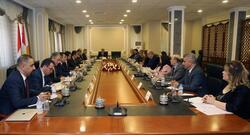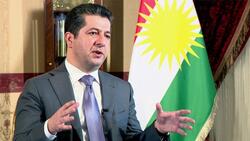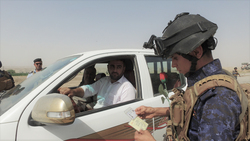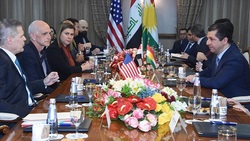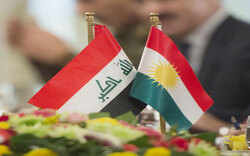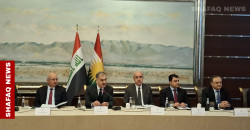U.S. waves "Magnitsky Act".. Sanctions on Baghdad and then decamping to Erbil
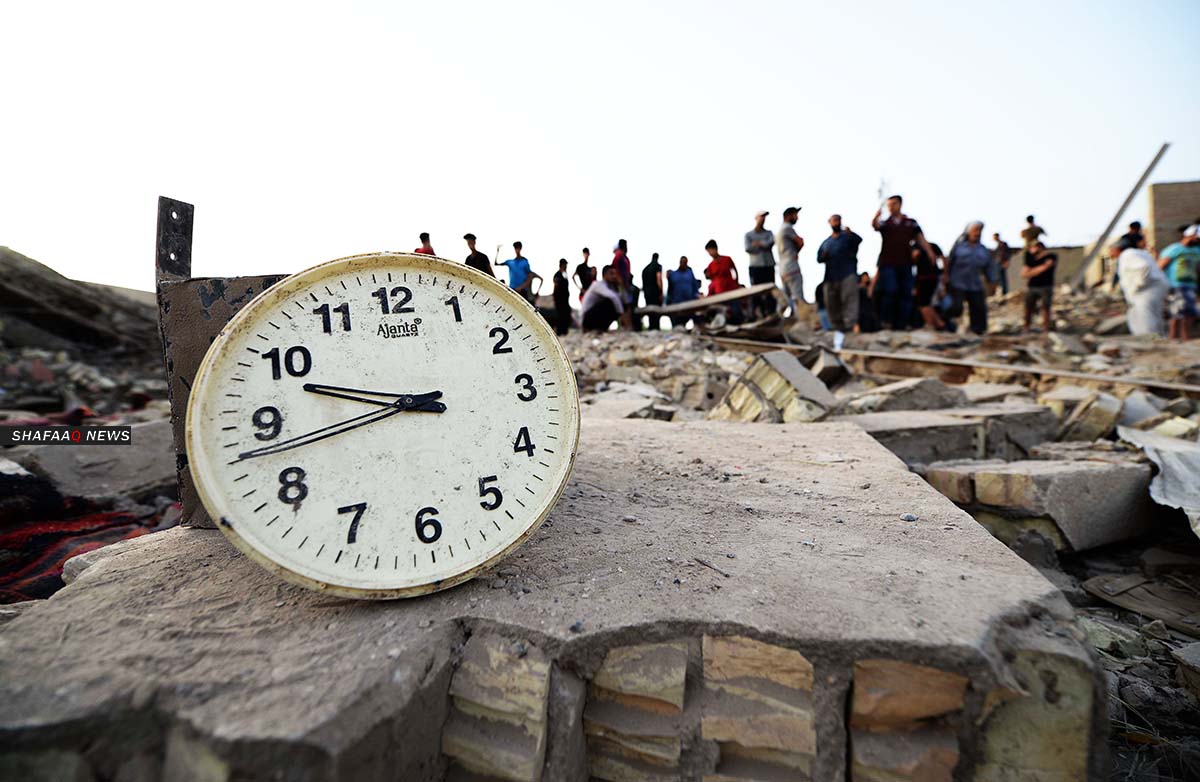
Shafaq News / Iraq suddenly found itself facing two tough possibilities from the U.S. "ally"; the first is the possibility of closing the U.S. embassy in Baghdad, and the second is the possibility of Washington resorting to sanctions against Iraq.
While the threat to close the embassy in Baghdad is still under discussion by the U.S. side -or used as a tool to put pressure on the government of Mustafa Al-Kadhimi to ensure protection for U.S. diplomatic and military headquarters on Iraqi soil, the possible options for such a U.S. move are to actively move the U.S. ambassador and embassy to Erbil, until security conditions clear to make the Americans more secure in Baghdad.
An informed source told Shafaq News agency, “U.S. President, Donald Trump, seems unlikely to risk losing any U.S. soldiers or diplomats in the few weeks leading up to the American presidential election, coming under attack from Democrats because he was aware of the dangers in Iraq but did not act to ensure the safety of Americans. Therefore, the move to close the embassy or withdraw the ambassador to Kurdistan does not seem to be a highly unlikely possibility”.
Therefore, Baghdad’s government can take the bitter choice of withdrawing the U.S. ambassador from Baghdad to Erbil as long as it is a temporary step. What raises serious concerns and questions in Baghdad is the possibility of the U.S. administration imposing sanctions on Iraq, a dangerous development between Baghdad and Washington, which in recent weeks have engaged in deep discussions on the future of their relations as part of a strategic dialogue that led to an unprecedented visit of the Iraqi Prime Minister to Washington to meet with the U.S. President Donald Trump.
U.S. researchers and experts have previously suggested that Washington should use the sanctions against Baghdad to force it to follow the path of political, security, and reform changes, but it has remained in the context of analysis and recommendations and has not turned into a conviction within the corridors of the administration, especially in the White House, the State Department, the Treasury Department, and the Pentagon.
Baghdad has remained assured of good relations with successive U.S. administrations -whatever the circumstances- because Washington has been treating Iraq as a central state in maintaining the U.S. interests in the region; in the war on terror and in countering the Iranian influence. Therefore, for many Iraqi officials, as well as observers and analysts in Iraq, the transition to punitive action remained an unlikely option.
"If the United States closes its embassy in Baghdad, there will be no sanctions behind any decision taken by the U.S. administration, for Iraq is still Washington's strategic goal in the Middle East", Fadhil Abu Ragheef, an expert on Iraqi politics and security, told Shafaq News agency.
There is probably a model of concern for Iraqi officials and party leaders, namely Lebanon. Although successive U.S. administrations have confirmed their keenness to stabilize the rule in Beirut -especially in recent years, this has not prevented Washington from imposing sanctions, not on the official Lebanese regime, but personalities and forces; including those in power or those close to them, on various charges and per various U.S. sanctions laws.
Just as Iraq has its unique regional importance to Washington, Lebanon also has other important American considerations, including that any security disturbance in Lebanon could pose a threat to Israel's security and negatively affect it, a central country in U.S. interest in the Middle East.
Therefore, Washington could draw a clear line between its good relations with the central state and other powers and figures, both in Iraq and in Lebanon -if Washington believes it affects its interests. The U.S. Treasury Department has already imposed sanctions on dozens of Lebanese figures and entities over the past few years, most recently three weeks ago, on prominent politicians who held former ministerial posts: Ali Hassan Khalil and Youssef Fenianos, one from the Shiite community and the other from the Christian community.
The charges which are commonly used are..Support and finance terrorism, associate with Hezbollah, then evolve into war-related roles in Syria and were recently added to them -with The Inclusion of Fenianos and Hassan Khalil- accusations such as corruption and suppression of the aspirations of the Lebanese people.
Such accusations can be used in Iraq as well. U.S. laws are ready and only need to be approved by the president. The U.S. Treasury Department has ready lists of those who can be charged, in consultation with the State Department and the Department of Justice.
For example, the Magnitsky act authorizes the United States to impose sanctions on those accused of human rights violations around the world by freezing their assets and financial transactions through banks and financial institutions globally, as well as banning them from entering U.S. territory. The law strengthens another law, the Patriot Act, enacted after the September 11, 2001 attacks.
The law could, for example, affect those referred to by the State Department spokesman in his speech to Shafaq News agency, “Iranian-backed groups were carrying out bombings in the Green Zone in Baghdad and also pose a threat to the Government of Iraq and nearby diplomatic missions as well as residents of the International Green Zone and surrounding areas. While the United States is working to secure financial support for Iraq from the international community and various private sector companies, the presence of outlawed and Iranian-backed militias remains the single biggest deterrent to additional investment in Iraq”.
The Americans can say -as they said about Lebanon recently- that these armed groups and their leaders are contributing to suppress the aspirations of the Iraqi people for stability, security, and prosperity.
"There will certainly be no sanctions, especially since America is part of what made the current Iraqi political system; it will not impose sanctions on its allies in Iraq, even if the embassy is closed", Abu Ragheef told Shafaq News agency, adding, "If the United States closes its embassy in Baghdad, this is a kind of protest against some of the rocket attacks, which does not cut off the relationship between Baghdad and Washington, but will continue to communicate and support at all levels”.
The U.S. sanctions, the most dangerous of which is imposed by the U.S. Treasury Department's Office of Foreign Assets Control (OFAC), could affect other joints in the Iraqi body, possibly political, partisan, and businessmen who have played different roles on the Syrian scene; whether in the war itself or economic dealings, even if they are purely commercial and do not affect security and military affairs.
On January 20th, the so-called "Caesar Syria Civil Protection Act" was passed, which came into effect on June 17th and is primarily aimed at punishing the Syrian regime for war crimes, but it is also dangerous that it allows Americans to punish anyone with trade, financial, investment, military, or security relationship with The Syrians; a law that effectively prohibits any entity or state from concluding contracts with Damascus, even for the reconstruction of what was destroyed by the war, and therefore, the most affected may be Russian and Iranian companies.. Perhaps The Iraqi companies are also betting on investing in the enormous reconstruction wheel in Syria.
If Trump chooses to approve a list of Iraqi names, including party figures, especially those of the Popular Mobilization Forces (PMF), which have fought in the Syrian arena against terrorism and may include the names of Iraqi ministers or officials that Washington suspects have facilitated or cooperated with their Syrian or Iranian counterparts.
Such sanctions, if effectively implemented, would greatly confuse Iraqi politics and put additional obstacles to Al-Kadhimi, who is struggling to deal with tons of existing files and crises.
Perhaps the last meeting of the Four Iraqi Presidencies was in anticipation of the threat sought by the Americans.. According to the meeting, the need to limit arms by the state, protect diplomatic missions, and address illegal acts were keenly discussed in the presence of President Barham Saleh, Prime Minister Mustafa Al-Kadhimi, speaker of the House of Representatives Mohammed al-Halbousi, and president of the Supreme Judicial Council Judge Faiq Zidan.
The quartet meeting took place in this tense atmosphere, as a message that the Iraqi authorities are determined to address the factors that could lead the Americans to either leave the embassy in Baghdad or impose sudden sanctions on Iraqi personalities and parties or both.
The Washington Post, quoting a diplomat, said Washington could close the embassy in Baghdad for 90 days, following Secretary of State Mike Pompeo's secret warning that his country would close its embassy in Baghdad if the Iraqi government did not act to stop attacks by Tehran-backed factions on U.S. interests.
"The United States has informed the Iraqi government and its diplomatic partners that it plans to withdraw completely from its embassy in Baghdad unless Iraq curbs attacks on individuals associated with the U.S. presence there, a move Iraqi officials said surprised them", reported the Washington Post.
"We hope that the U.S. administration will reconsider. Outlaws are trying to disrupt this relationship and closing the embassy will send a negative message", said Ahmed Mulla Talal, spokesman for Prime Minister Mustafa Al-Kadhimi.
Western officials in Baghdad were quoted as saying their country's diplomatic missions had been informed of the plan. A diplomat familiar with the situation said, "the closure of the embassy is expected to take 90 days, a window that would allow Trump’s administration to reassess the decision".
An Iraqi official said, “The U.S. government has asked for stronger action against the militias”, noting that, “The embassy's closure could be avoided if that happened”.
A senior official in Al-Kadhimi's office said on Sunday that the prime minister is now pressuring European partners to try to persuade the United States to reverse its decision, citing the negative consequences on the country's stability.. while officials from three European embassies in Baghdad said their country would stay even if the United States left.
"The United States will not close its embassy in Iraq, because Washington is not the type to withdraw”, said Abu Ragheef.
"Iraq is seen by the United States as a positive neutral ally, and that is why Washington cannot leave Iraq. The nature of Iraqi discourse -especially the official- confirms that Iraq is distancing itself from regional and international conflicts, which is the reason behind the continuous U.S. support for Iraq" Issam Al-Faily, political science professor in Baghdad, told Shafaq News agency.
"Even if Washington decides to temporarily suspend the embassy, there will be no sanctions on Iraq.. Especially since America understands that by closing the embassy, there will be a closure of embassies, missions, and other consulates, which the United States does not want" Al-Faily said.
Issam Al-Faily concluded, "Waving or threatening to close the embassy is a test by Washington, to reflect the pulse of political forces and the positions of other countries; as is a message to the armed factions in the first place, that the continuation of the bombings and targeting of convoys will lead to a U.S. position to temporarily suspend the work of the embassy or the withdrawal of the U.S. ambassador to the consulate in Erbil".
